高考英语单词变形规则汇总(共44张PPT)
- 格式:pptx
- 大小:414.05 KB
- 文档页数:44
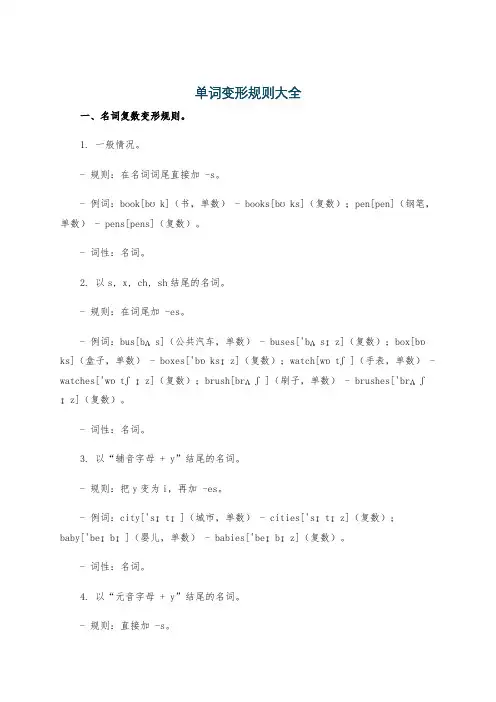
单词变形规则大全一、名词复数变形规则。
1. 一般情况。
- 规则:在名词词尾直接加 -s。
- 例词:book[bʊk](书,单数) - books[bʊks](复数);pen[pen](钢笔,单数) - pens[pens](复数)。
- 词性:名词。
2. 以s, x, ch, sh结尾的名词。
- 规则:在词尾加 -es。
- 例词:bus[bʌs](公共汽车,单数) - buses['bʌsɪz](复数);box[bɒks](盒子,单数) - boxes['bɒksɪz](复数);watch[wɒtʃ](手表,单数) - watches['wɒtʃɪz](复数);brush[brʌʃ](刷子,单数) - brushes['brʌʃɪz](复数)。
- 词性:名词。
3. 以“辅音字母 + y”结尾的名词。
- 规则:把y变为i,再加 -es。
- 例词:city['sɪtɪ](城市,单数) - cities['sɪtɪz](复数);baby['beɪbɪ](婴儿,单数) - babies['beɪbɪz](复数)。
- 词性:名词。
4. 以“元音字母 + y”结尾的名词。
- 规则:直接加 -s。
- 例词:day[deɪ](天,单数) - days[deɪz](复数);toy[tɔɪ](玩具,单数) - toys[tɔɪz](复数)。
- 词性:名词。
5. 以f或fe结尾的名词。
- 规则:把f或fe变为v,再加 -es。
- 例词:knife[naɪf](刀,单数) - knives[naɪvz](复数);leaf[liːf](树叶,单数) - leaves[liːvz](复数)。
- 词性:名词。
但也有一些特殊情况,直接加 -s,如roof[ruːf](屋顶,单数) - roofs[ruːfs](复数)。
6. 不规则复数形式。
- 例词:man[mæn](男人,单数) - men[men](复数);woman['wʊmən](女人,单数) - women['wɪmɪn](复数);child[tʃaɪld](孩子,单数) - children['tʃɪldrən](复数);foot[fʊt](脚,单数) - feet[fiːt](复数);tooth[tuːθ](牙齿,单数) - teeth[tiːθ](复数);mouse[maʊs](老鼠,单数) - mice[maɪs](复数)。
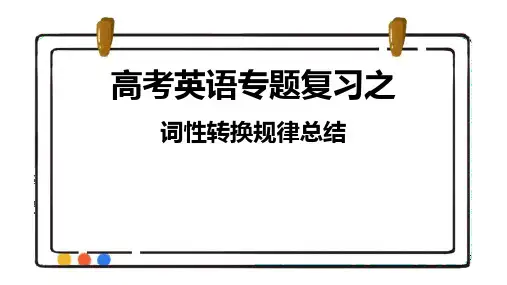
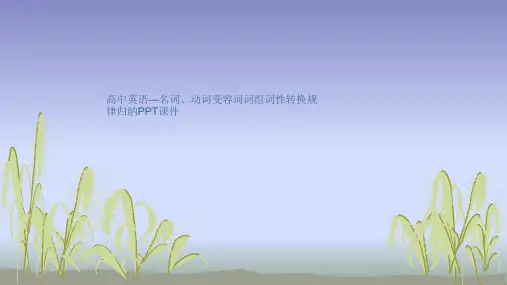
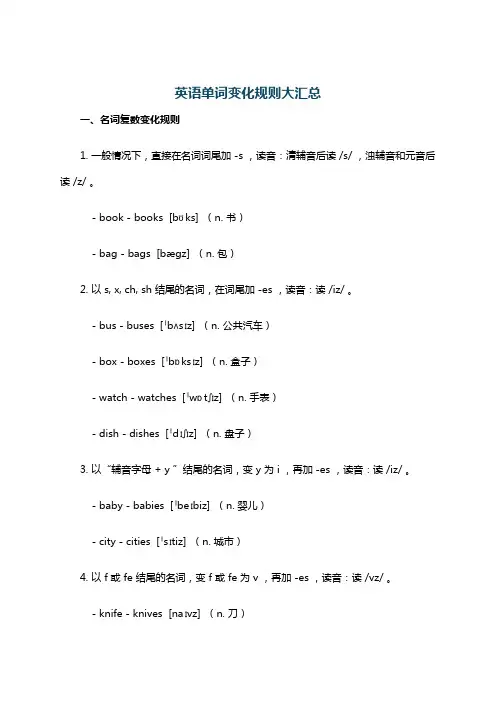
英语单词变化规则大汇总一、名词复数变化规则1. 一般情况下,直接在名词词尾加 -s ,读音:清辅音后读 /s/ ,浊辅音和元音后读 /z/ 。
- book - books [bʊks] (n. 书)- bag - bags [bæɡz] (n. 包)2. 以 s, x, ch, sh 结尾的名词,在词尾加 -es ,读音:读 /iz/ 。
- bus - buses [ˈbʌsɪz] (n. 公共汽车)- box - boxes [ˈbɒksɪz] (n. 盒子)- watch - watches [ˈwɒtʃɪz] (n. 手表)- dish - dishes [ˈdɪʃɪz] (n. 盘子)3. 以“辅音字母 + y ”结尾的名词,变 y 为 i ,再加 -es ,读音:读 /iz/ 。
- baby - babies [ˈbeɪbiz] (n. 婴儿)- city - cities [ˈsɪtiz] (n. 城市)4. 以 f 或 fe 结尾的名词,变 f 或 fe 为 v ,再加 -es ,读音:读 /vz/ 。
- knife - knives [naɪvz] (n. 刀)- leaf - leaves [liːvz] (n. 树叶)5. 不规则变化- man - men [men] (n. 男人)- woman - women [ˈwɪmɪn] (n. 女人)- child - children [ˈtʃɪldrən] (n. 孩子)- foot - feet [fiːt] (n. 脚)- tooth - teeth [tiːθ] (n. 牙齿)- mouse - mice [maɪs] (n. 老鼠)二、动词第三人称单数变化规则1. 一般情况下,直接在动词词尾加 -s ,读音:清辅音后读 /s/ ,浊辅音和元音后读 /z/ 。
- work - works [wɜːks] (v. 工作)- play - plays [pleɪz] (v. 玩)2. 以 s, x, ch, sh 结尾的动词,在词尾加 -es ,读音:读 /iz/ 。
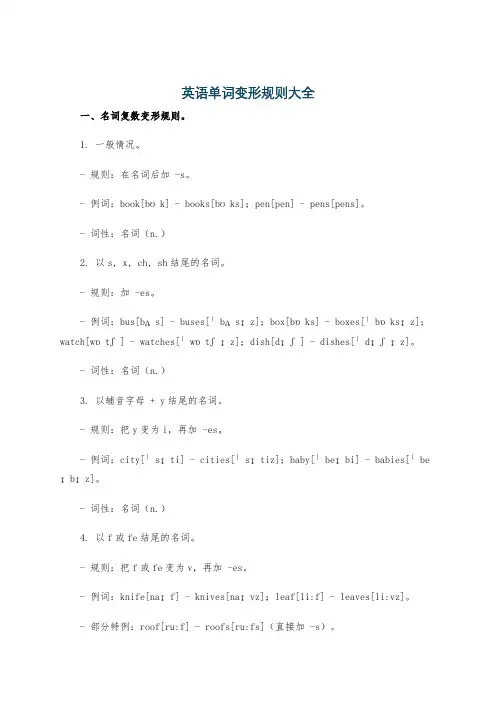
英语单词变形规则大全一、名词复数变形规则。
1. 一般情况。
- 规则:在名词后加 -s。
- 例词:book[bʊk] - books[bʊks];pen[pen] - pens[pens]。
- 词性:名词(n.)2. 以s, x, ch, sh结尾的名词。
- 规则:加 -es。
- 例词:bus[bʌs] - buses[ˈbʌsɪz];box[bɒks] - boxes[ˈbɒksɪz];watch[wɒtʃ] - watches[ˈwɒtʃɪz];dish[dɪʃ] - dishes[ˈdɪʃɪz]。
- 词性:名词(n.)3. 以辅音字母 + y结尾的名词。
- 规则:把y变为i,再加 -es。
- 例词:city[ˈsɪti] - cities[ˈsɪtiz];baby[ˈbeɪbi] - babies[ˈbe ɪbɪz]。
- 词性:名词(n.)4. 以f或fe结尾的名词。
- 规则:把f或fe变为v,再加 -es。
- 例词:knife[naɪf] - knives[naɪvz];leaf[li:f] - leaves[li:vz]。
- 部分特例:roof[ru:f] - roofs[ru:fs](直接加 -s)。
5. 以o结尾的名词。
- 规则:- 有生命的加 -es,如:potato[pəˈteɪtəʊ] - potatoes[pəˈteɪtəʊz];tomato[təˈmɑ:təʊ] - tomatoes[təˈmɑ:təʊz]。
- 无生命的加 -s,如:photo[ˈfəʊtəʊ] - photos[ˈfəʊtəʊz];piano[piˈænəʊ] - pianos[piˈænəʊz]。
- 词性:名词(n.)二、动词第三人称单数变形规则(与名词复数变形规则有相似之处)1. 一般情况。
- 规则:在动词后加 -s。
- 例词:like[laɪk] - likes[laɪks];play[pleɪ] - plays[pleɪz]。
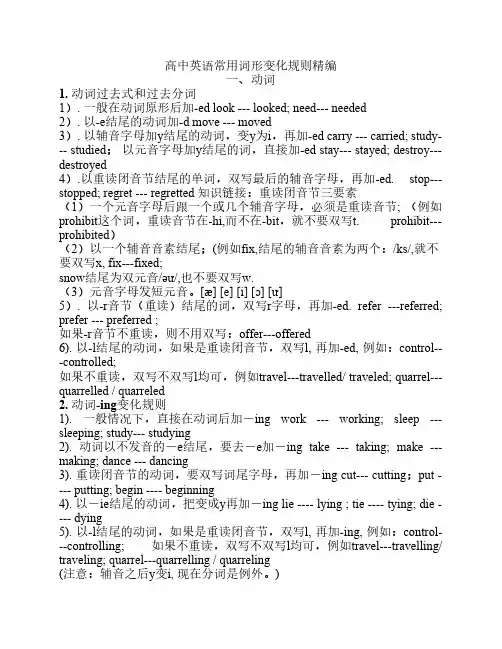
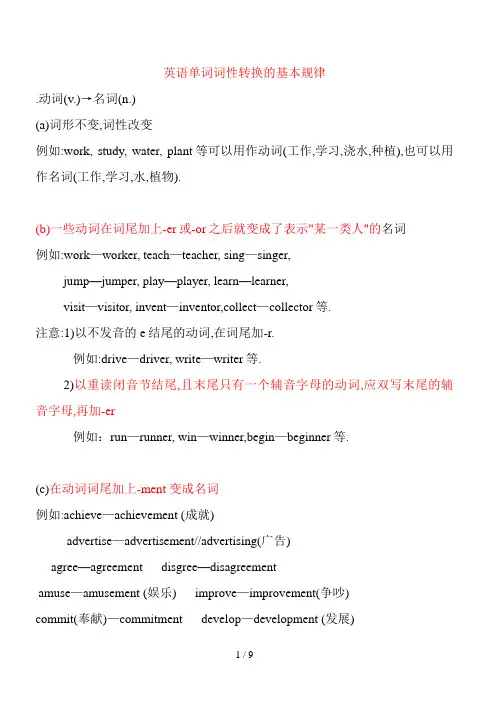
英语单词词性转换的基本规律.动词(v.)→名词(n.)(a)词形不变,词性改变例如:work, study, water, plant等可以用作动词(工作,学习,浇水,种植),也可以用作名词(工作,学习,水,植物).(b)一些动词在词尾加上-er或-or之后就变成了表示"某一类人"的名词例如:work—worker, teach—teacher, sing—singer,jump—jumper, play—player, learn—learner,visit—visitor, invent—inventor,collect—collector等.注意:1)以不发音的e结尾的动词,在词尾加-r.例如:drive—driver, write—writer等.2)以重读闭音节结尾,且末尾只有一个辅音字母的动词,应双写末尾的辅音字母,再加-er例如:run—runner, win—winner,begin—beginner等.(c)在动词词尾加上-ment 变成名词例如:achieve—achievement (成就)advertise—advertisement//advertising(广告)agree—agreement disgree—disagreementamuse—amusement (娱乐) improve—improvement(争吵)commit(奉献)—commitment develop—development (发展)depart—department (局,部) govern(统治)—government(政府) manage—management (管理) equip—equipment (装备)有些单词比较特殊,需把动词后的e去掉再加ment.例如:argue—argument(争论)(d)在动词词尾加上-(t)ion/(s)ion变成名词例如: attract—attraction; instruct—instruction;invent—invention discuss—discussion;express—expression educate—education;graduate—graduation; operate—operation (去e再加"ion")compete—competition; organize—organization (把e改成其他字母再加"tion") decide—decision conclude—conclusion (把de改为s再加"ion")describe—description描写,描绘 (这是特例,不规则变化)(e)在动词词尾加上-ance变成名词例如: appear—appearance (外貌;出现)perform—performance (演出)accept—acceptance (接受)(f)在动词词尾加-ing变成名词 (方法与动词变为现在分词的方法相同)例如:meet—meeting build—building wait—waitingbathe—bathing say—saying(谚语) mean—meaningend —ending train —training wash—washing注意:以重读闭音节结尾,且末尾只有一个辅音字母的动词,应双写末尾的辅音字母,再加-ing如:swim—swimming shop—shopping begin—beginning(g)其他一些比较特殊的变化例如: Beg(乞讨)—beggar(乞丐) behave(行为举止)—behaviorknow(知道)—knowledge(知识) fly—flight (飞行)heat (加热)—heat(热量) hit (撞击)—hit( 轰动一时的人或物,碰撞)mix (混合)—mixture(混合物) press(按,压)—pressure(压力)sit(坐)—seat (座位) succeed—success(成功)tour—tour(旅游)/ tourist (游客)2.动词(v.)→形容词(adj.)(a)动词后面加able,以e结尾的动词则去e加able,表示具有此性质,特点或属性.例如: afford-affordable;love-lovable(b)动词后面加ed,以e结尾的动词则直接加d,表示被动性的属性或特点.例如: scatter-scattered use-used(c)不规则的动词则必须记忆,记住其过去分词形式.规律不大,意义同(b).3.名词(n.)→形容词(adj.)(a)在名词后面加-y可以变成形容词(尤其是一些与天气有关的名词)例如: rain—rainy, cloud—cloudy, wind—windy, snow—snowy,health—healthy, luck—lucky,anger—angry guilt—guilty(内疚的)tourist—touristy(游客多的) , salt (盐)—salty (咸的)silk(丝绸)—silky(丝绸般的), sleep—sleepy (昏昏欲睡的)注意:1)如果以重读闭音节结尾,且词尾只有一个辅音字母,这时应双写辅音字母再加"-y".如: sun—sunny, fun—funny, fog—foggy(有雾的), fur—furry(毛皮的)2)少数以不发音的e结尾的名词变为形容词时,应去掉e再加"-y".如: noise—noisy, ice—icy, shine—shiny(发亮的), taste(口味)—tasty(甜的)(b)名词后面加-ed,以e结尾的直接加d.例如: spot(斑点)—spotted(有斑点的); talent—talented (有天赋的)organize—organized 有组织的; balance—balanced(平衡的)(c)一些抽象名词在词尾加-ful可以变为形容词例如:care—careful, thank—thankful, help—helpful,use—useful, meaning—meaningful(d)在名词后加-less构成含有否定意义的形容词例如:care—careless(粗心的), use—useless(无用的)hope—hopeless(没希望的),home—homeless(无家可归的)(e)一些以-ce结尾的名词,把-ce改为-t变成形容词例如: difference—different, silence—silent, confidence—confident(f).在名词后加-ly变为形容词例如: friend—friendly, love—lovely, live---lively(g).在名词后加-ous变为形容词例如: danger—dangerous(h)名词后面加-al变为形容词例如: music—musical; medicine—medical (这个比较特殊)(i)名词后面加-able变为形容词,如果以e结尾就去e再加"-able". 例如: adjust—adjustable 可调整的 value—valuable有价值的(j)名词后面加-en变成形容词例如: wood—wooden 木制的 wool—woolen 羊毛的(k)一些表示国家的名词可以在词尾加-ese, -ish或-n构成表示国籍,语言的形容词例如:China—Chinese, Japan—Japanese, England—English,America—American, India—Indian, Australia —Australian(注意Canada—Canadian)4..形容词(adj.)→副词(adv.)▲一般在形容词的词尾加-ly可以变成副词例如: quick—quickly, slow—slowly, loud—loudly, sudden—suddenly 等但是,以下几点值得注意:(a) 一些以"辅音字母+y"结尾的形容词,要把y改为i再加-ly例如: happy—happily, angry—angrily, lucky—luckily, heavy—heavily, noisy—noisily(b) 有些以-ble或-le结尾的形容词,去掉e加-y例如:possible—possibly, terrible—terribly(c)少数以e结尾的形容词,要去掉e再加-ly例如: true—truly但绝大多数以e结尾的形容词仍然直接加-ly 例如: polite—politely, wide—widely(d)以-l结尾的形容词变为副词时要在词尾加-ly,以-ll结尾的才在词尾只加-y.例如: usual—usually, careful—carefully, useful—usefullyfull—fully (以-ll结尾的才只加y)元音辅音以及重读闭音节:1.英语26个字母中,a e i o u是元音字母, y是半元音字母, 其余都是辅音字母.★所谓半元音就是有时候做元音,有时候做辅音.半元音字母y做元音有: shy,sky做辅音比如最简单的:yes2.开音节和闭音节开音节分两种:绝对开音节和相对开音节绝对开音节指的是"元音字母结尾"的音节 (例如 we, hi等)相对开音节是指"辅音字母-元音字母-辅音字母-不发音的e"的音节,(r除外). ( 例如,take,make等)比如:take (在这个单词中,t是辅音,a是元音,k是辅音,e是不发音的元音)◆在开音节中, 元音字母发他们在字母表中的音闭音节, 则是指"辅音字母-元音字母-辅音字母"的音节( -al等除外) (例如:leg,cross等)◆在闭音节中,元音字母发不同的音a e i o u例 sat let sit not nut (试着读下这些单词,这些单词中,元音发的音都不是它们在字母表中发的音)2.英语重读闭音节就是以辅音因素结尾的,而且是重读音节的音节.比如apple 划音节就因该是ap/ple 前面那个ap是一个音节,这个音节以辅音因素p结尾,所以就是闭音节.(仅仅能看出是闭音节,是不是重读闭音节还要看这个音节是不是重读的)重读闭音节三要素:1. 必须是重读音节;2. 最后只有一个辅音字母;3.元音字母发短元音 ( 说通俗点,打个比方, /u/是短元音,/u:/是长元音)重读闭音节即两个辅音中间夹一个元音.如:sit---sitting begin---beginning(重读在gin这个音节上)●像travel这个单词,"vel"也是"辅音+元音+辅音"的结构,但是重音不在vel这个音节上,所以不用双写"l",可以为travelled,也可以是traveled,更常用的是后者.。
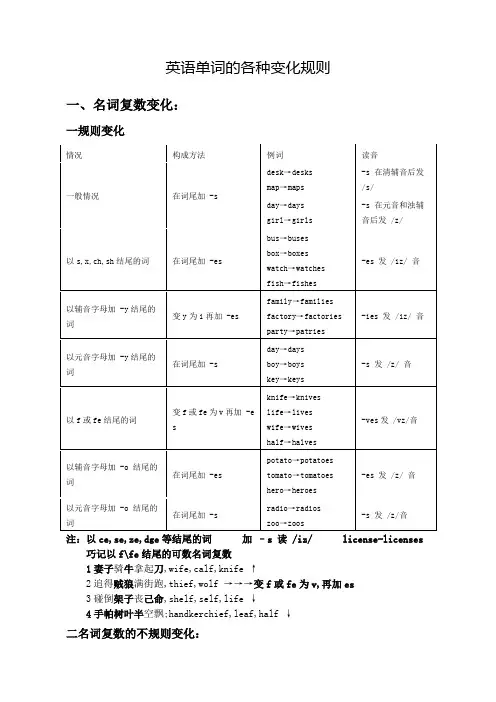
英语单词的各种变化规则一、名词复数变化:1.child→children儿童man→men男人woman→women 女人an Englishman→two Englishmen英国人foot→feet脚tooth→teeth牙mouse→mice老鼠ox →oxen公牛goose→geese鹅2.同形deer,sheep,fish,Chinese,Japanese,Swiss, species,means除,、、等都有复数形式;如:a dollar,two dollars; a meter,two meters3.,以单数形式出现,但实为复数;people police cattle是复数Correctness:a person,a policeman,a head of cattle,the English,the British,the French,the Chinese,the Japanese,the SwissError:a people,a police,a cattle表示国民总称时,作复数用;The Chinese are industrious and brave. 中国人民是勤劳勇敢的;4.以s结尾,仍为单数的名词1maths,politics,physics等学科名词,为不可数名词,是单数;2news是不可数名词;5. 表示由两部分构成的东西,glasses眼镜 trousers 长裤 clothes衣服若表达具体数目,要借助pair对,双a pair of glasses ,two pairs of trousers\suit套6.另外还有一些名词,其复数形式有时可表示特别意思goods 货物 waters 水域 fishes 各种鱼练习:写出下列各词的复数I _________ him _________ this ___________ her ______watch _______ child _______ photo ________ diary ______day________ foot________ book_______ dress ________ tooth_______ sheep ______ box________ strawberry _____ thief _______ fish______ peach______ sandwich ______ man______ woman_______ paper_______ juice___________ water________ milk________ rice__________ tea__________二、序数词变化规则一一般化规则:基数词+th→序数词规则变化four四→fourth第四six六→sixth第六seven七→seventh第七ten十→tenth第十eleven十一eleventh→第十一二不规则变化的one一→first第一 twenty-one → twenty-firsttwo二→second第二three三→third第三five五→fifth第五eight八→eighth第八 fifty-eight → fifty-eighthnine九→ninth第九twelve十二→twelfth第十二三从13—19的基数词,都在个位数后加teen构成14→fourteen15→fifteen16→sixteen17→seventeen18→eighteen19→nineteen四整十的序数词,变y为ie再加th20 twenty→twentieth第二十30 thirty→thirtieth第三十40 forty→fortieth第十四50 fifty→fiftieth第五十60 sixty→sixtieth第六十70 seventy→seventieth第七十80 eight→eightieth第八十90 ninety→ninetieth第九十五分数的表达:分子用:基数词分母用:序数词特别要注意:当分子大于1时,分母要用:复数1/2 one second ; a half ; 1/4 a quarter ;3/4 three quarters7/8 seven eighths3/5 three fifths六加减乘除表达a decimal number 小数a fraction 分数a percentage 百分数a odd number奇数an even number 偶数degrees 度数1 加:and; plus; add to2+4=6Two and four is/equals six.或Two plus four is/equals six.或Two added to four equals six.2减:minus ; subtract from 8-3=5Eight minus three is/equals five.或Three subtracted from eight is five.3乘:multiply...by;multiplied by /times 3×5=15Multiply three by five is/equals fifteen.或Three multiplied by five is/equals fifteen.4除:divide by.../divide ...by... 24÷8=3Twenty-four divided by eight is/equals three.或Divide 24 by 8 is /equals three.三.形容词比较级和最高级的变化规则:1.一般在词尾加er/est;2.以字母e 结尾,加r/st ;3.以一个元音字母和一个辅音字母结尾,应双写末尾的辅音字母,再加er/st ;原级比较级最高级slim slimmer slimmestbig bigger biggesthot hotter hottestfat fatter fattestthin thinner thinnestwet wetter wettestred redder reddestsad sadder saddest4.以“辅音字母+y”结尾,先把y变i,再加er/st5.多音节词.和部分双音节词,在单词前面加more或mostimportant more important most importantdifficult more difficult most difficultinteresting more interesting most interestinguseful more useful most usefulbeautiful more beautiful most beautiful6.不规则形容词比较级:原级比较级最高级good/well better bestbad/ill worse worstmany/much more mostlittle less leastold older/elder oldest/eldestred redder reddestfar further/farther furthest /farthest写出下列形容词的比较级和最高级old__________ young________ tall_______ long________short________ strong________ big________ small_______fat_________ thin__________ heavy______ light________nice________ good_________ beautiful____________________high_________ slow_______ fast________ low______late__________ early_________ far_________ well_______四.动词第三人称单数变化规则1.一般情况下,直接加-s,如:cook-cooks, milk-milks2.以s. x. sh. ch. o结尾,加-es,如:guess-guesses, wash-washes, watch-watches, go-goes3.以“辅音字母+y”结尾,变y为i, 再加-es,如:study-studies写出下列动词的第三人称单数drink ________ go _________ stay ________ make ________ look _________ have_______ pass_______ carry ________come________ watch______ plant_______ fly __________ study_______ brush________ do_________ teach________五.动词现在分词加ing的变化规则1.一般情况下,直接加ing, 如:cook-cooking2.以不发音的e结尾,去e加ing,如:make-making, taste-tasting3. 以ie结尾的动词,把ie变为y再加ing;如:lie - lying 平躺/说谎tie - tying系,捆鞋带,领带die - dying死4.如果末尾是一个元音字母和一个辅音字母,双写末尾的辅音字母,再加ing,这类动词有:Begin---- beginning 开始cut ---- cutting 剪、切dig ---- digging 挖get ---- getting 获得、得到、取hit ---- hitting 击、打、撞let ---- letting 让put ---- putting 放run ---- running 跑set ---- setting 设置、套shut ---- shutting 关闭、闭sit ---- sitting 坐babysit-----babysitting 临时受顾照看婴儿、照看小孩spit ---- spitting 吐痰、吐split ---- splitting 劈、分裂skip-----skipping 跳绳swim ---- swimming 游、游泳win ---- winning 赢、获胜shop---- shopping 购物、逛商店prefer----preferring 更喜欢….Step---- stepping 踩、踏Refer---- referring 参考、查阅Dip---- dipping 浸、泡、醮、舀取、吸出、掏Mop---- mopping 用拖把拖、洗、擦、抹、另:猫扑Nod ----nodding 点头Fret---- fretting 使烦恼烦恼、使烦躁,使发愁,Kidnap-----kidnapping 绑架Nap-----napping 小睡、打盹Rot-----rotting 腐蚀、腐烂Spot-----spotting 玷污Hiccup-----hiccupping 打嗝beg ---- begging 乞求、乞讨drip ---- dripping 雨滴落、滴下、滴dot ---- dotting 打点、打句号drop ---- dropping 坠落、落下fit ---- fitting 适合、合适hug ---- hugged 拥抱、怀抱、紧抱、抱有、持有plan ---- planning 计划、打算pat ---- patting 轻拍打、抚拍rid ---- ridding 使免除、使摆脱、去掉rob ---- robbing 抢劫、动掠、盗取、剥夺reset ---- resetting 重排放、植、重接断骨regret ---- regretting 遗憾、懊悔、感到后悔抱歉stop ---- stopping 停止、停下、住手stir ---- stirring 搅拌、搅动、拨动、传布rub ---- rubbing 擦上、摩擦、擦到travel ---- travelling 旅行、行进、步行、交往whip ---- whipping 揩、擦汗、水Slip --------slipping 滑倒、跌倒Wrap -------wrapping 包装打包、包、裹、缠绕、卷写出下列动词的现在分词:play________ run__________ swim _________ make__________go_________ like________ write________ _ ski___________ read________ have_________ sing ________ dance_________ put_________ see________ buy _________ love____________ live_______ take_________ come ________ get_________ stop_________ sit ________ begin________ shop___________四.动词过去式变化规则:1.一般在动词末尾加-ed,如:pull-pulled, cook-cooked2.结尾是e加d,如:taste-tasted3.以“辅音字母+y”结尾的,变y为i, 再加-ed,如:study-studied4.末尾只有一个元音字母和一个辅音字母的重读闭音节,应双写末尾的辅音字母,再加-ed,如beg ---- begged 乞求、乞讨dip---- dipped 浸、泡、醮、舀取、吸出、掏dot ---- dotted 打点、打句号drip ---- dripped 雨滴落、滴下、滴drop ---- dropped 坠落、落下fit ---- fitted 适合、合适hiccup-----hiccupped 打嗝hug ---- hugged 拥抱、怀抱、紧抱、抱有、持有kidnap-----kidnapped 绑架mop---- mopped 用拖把拖、洗、擦、抹、另:猫扑nap-----napped 小睡、打盹nod ----nodded 点头pat ---- patted 轻拍打、抚拍plan ---- planned 计划、打算prefer----preferred 更喜欢….refer---- referred 参考、查阅regret ---- regretted 遗憾、懊悔、感到后悔抱歉rid ---- ridded 使免除、使摆脱、去掉rob ---- robbed 抢劫、动掠、盗取、剥夺rot-----rotted 腐蚀、腐烂rub ---- rubbed 擦上、摩擦、擦到shop---- shopped 购物、逛商店slip --------slipped 滑倒、跌倒skip------skipped 跳绳spot-----spotted 玷污step---- stepped 踩、踏stir ---- stirred 搅拌、搅动、拨动、传布stop ---- stopped 停止、停下、住手trip-----tripped 绊倒travel ---- travelled 旅行、行进、步行、交往whip ---- whipped 揩、擦汗、水wrap -------wrapped 包装打包、包、裹、缠绕、卷。
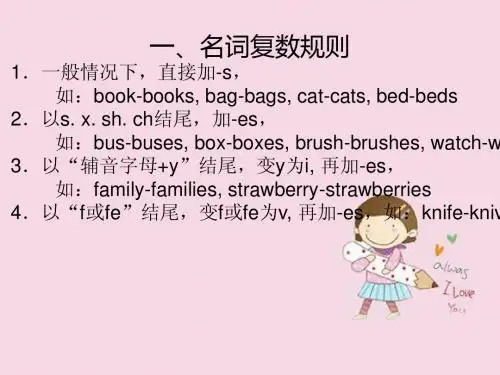
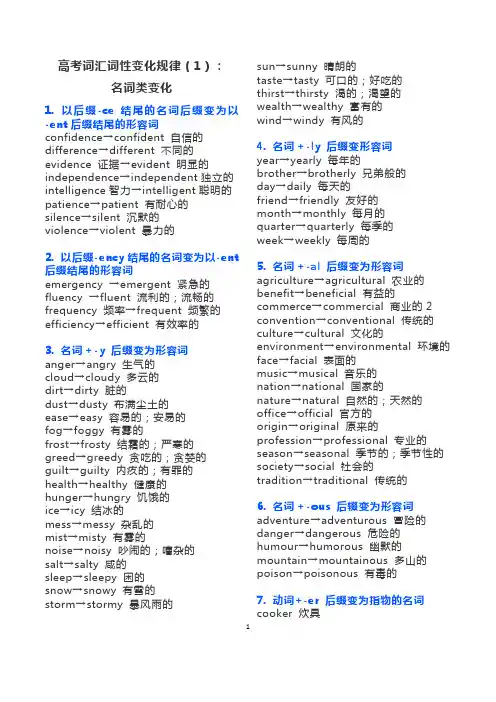
高考词汇词性变化规律(1):名词类变化1. 以后缀-ce结尾的名词后缀变为以-ent后缀结尾的形容词confidence→confident 自信的difference→different 不同的evidence 证据→evident 明显的independence→independent独立的intelligence智力→intelligent聪明的patience→patient 有耐心的silence→silent 沉默的violence→violent 暴力的2. 以后缀-ency结尾的名词变为以-ent 后缀结尾的形容词emergency →emergent 紧急的fluency →fluent 流利的;流畅的frequency 频率→frequent 频繁的efficiency→efficient 有效率的3. 名词+-y 后缀变为形容词anger→angry 生气的cloud→cloudy 多云的dirt→dirty 脏的dust→dusty 布满尘土的ease→easy 容易的;安易的fog→foggy 有雾的frost→frosty 结霜的;严寒的greed→greedy 贪吃的;贪婪的guilt→guilty 内疚的;有罪的health→healthy 健康的hunger→hungry 饥饿的ice→icy 结冰的mess→messy 杂乱的mist→misty 有雾的noise→noisy 吵闹的;嘈杂的salt→salty 咸的sleep→sleepy 困的snow→snowy 有雪的storm→stormy 暴风雨的sun→sunny 晴朗的taste→tasty 可口的;好吃的thirst→thirsty 渴的;渴望的wealth→wealthy 富有的wind→windy 有风的4. 名词+-ly 后缀变形容词year→yearly 每年的brother→brotherly 兄弟般的day→daily 每天的friend→friendly 友好的month→monthly 每月的quarter→quarterly 每季的week→weekly 每周的5. 名词+-al 后缀变为形容词agriculture→agricultural 农业的benefit→beneficial 有益的commerce→commercial 商业的2 convention→conventional 传统的culture→cultural 文化的environment→environmental 环境的face→facial 表面的music→musical 音乐的nation→national 国家的nature→natural 自然的;天然的office→official 官方的origin→original 原来的profession→professional 专业的season→seasonal 季节的;季节性的society→social 社会的tradition→traditional 传统的6. 名词+-ous 后辍变为形容词adventure→adventurous 冒险的danger→dangerous 危险的humour→humorous 幽默的mountain→mountainous 多山的poison→poisonous 有毒的7. 动词+-er 后缀变为指物的名词cooker 炊具1counter 柜台drawer 抽屉receiver 听筒;话筒speaker 扬声器typewriter 打字机8. 名词加后缀-ician 表示人electrician n.电工magician n.魔术师musician n.音乐家physician n.内科医生politician n.政治家technician n.技术员9. 以-ist 后缀结尾的名词,表示人,...家,...者art→artist 艺术家biology→biologist 生物学家journal→journalist 新闻工作者;记者physics→physicist 物理学家piano→pianist 钢琴家psychology→psychologist 心理学家science→scientist 科学家social→socialist 社会主义者special→specialist 专家tour→tourist 游客10. 以后缀-ology结尾的名词,表示...学archaeology 考古学biology 生物学ecology 生态学geology 地质学psychology 心理学sociology 社会学technology 技术;工艺11. 名词+-ic 后缀结尾,变为形容词drama→dramatic 戏剧(性)的energy→energetic 精力充沛的enthusiasm→enthusiastic 热情的romance→romantic 浪漫的science→scientific 科学的sympathy→sympathetic 同情的12. 名词+-hood 后缀变为名词adult→adulthood 成年boy→boyhood 少年时代brother→brotherhood 手足之情child→childhood 童年man→manhood 男子气概neighbour→neighbourhood邻里;街坊13. 名词+-ship 后缀结尾,变为抽象名词championship 冠头军衔friendship 友谊hardship 困苦;苦难leadership 领导地位;领导才能membership 成员资格relationship 关系scholarship 奖学金高考词汇词性变化规律(2):动词类变化1.动词+后缀-y变为名词deliver→delivery 运送discover→discovery 发现recover→recovery 康复;恢复2.动词+后缀-ing 变为名词begin→beginning开始;开端build→building建筑(物)cross→crossing十字路口end→ending 结局;结尾engine→engineering 工程feel→feeling 感觉hear→hearing 听力market→marketing促销meet →meeting 会议paint→painting 绘画;油画2spend→spending 花销suffer→suffering 苦难train→training 训练;培养3. 动词+后缀-ment变为名词acquire→acquirement n. 取得accomplish→accomplishment 成就achieve→achievement 成就adjust→adjustment 调整;调节amuse→amusement 愉快;快乐;消遣announce→announcement宣告;述说appoint→appointment约会;预约;任命argue→argument 争论arrange→arrangement 安排assess→assessment 评估assign→assignment 分配;任务astonish→astonishment 惊讶develop→development 发展disappoint→disappointment 失望embarrass→embarrassment 尴尬employ→employment 雇用enjoy→enjoyment 享受;欢乐entertain→entertainment 款待;娱乐equip→equipment 设备establish→establishment 建立govern→government 统治;政府improve→improvement 提高judge→judgement 判断move→movement 运动;移动punish→punishment 惩罚settle→settlement 定居;解决state→statement 陈述;说明4. 动词+后缀-ive变为形容词act→active 积极的attract→attractive 吸引人的cooperate→cooperative 合作的impress→impressive 给人印象深刻的protect→protective 保护的relate→relative 相关的sense→sensitive 敏感的object→objective 客观的negative 消极的passive 被动的positive 积极的subjective 主观的5.动词+后缀-able变为形容词accept→acceptable 可接受的adjust→adjustable 可调节的admire→admirable 令人钦佩的afford→affordable 负担得起的change→changeable 易变的comfort→comfortable 舒服的consider→considerable 重要的;相当大的desire→desirable 值得做的;可取的enjoy→enjoyable 令人愉快的favour→favourable 赞成的;有利的forget→forgettable 健忘的honour→honourable 可敬的;光荣的reach→reachable 可获得的;可达到的reason→reasonable 合理的rely→reliable 可靠的;可信赖的remark→remarkable 不平凡的suit→suitable 合适的understand→understandable可理解的value→valuable 宝贵的6.动词+后缀-ed变为形容词absorb→absorbed专心的;聚精会神的accustom→accustomed 习惯的balance→balanced 平衡的bury→buried 专心的complicate→complicated 复杂的determine→determine坚定的;有决心的devote→devoted 忠实的experience→experienced 有经验的learn→learned 博学的limit→limited 有限的organize→organized 有组织的suppose→supposed 应该的3relate→related 相关的skill→skilled 熟练的unite→united 联合的;统一的7.动词+后缀-ing/+-ed变为形容词amuse→amusing 好笑的;有趣的→amused 愉快的astonish→astonishing 令人惊讶的→astonished 感到惊讶的bore→boring 令人厌烦的→bored 厌烦的confuse→confusing 令人迷惑的→confused 感到迷惑的convince→convincing 令人信服的→convinced 坚信不移的depress→depressing 令人沮丧的→depressed 沮丧的disappoint→disappointed 失望的→disappointing 令人失望的disturb→disturbing 令人不安的;→disturbed 扰乱的;精神失常的embarrass→embarrassing 令人尴的→embarrassed尴尬的excite→exciting 令人兴奋的→excited 兴奋的frighten→frightening 令人害怕的→frightened 害怕的relax→relaxing 使人放松的→relaxed 轻松的satisfy→satisfying 令人满意的→satisfied 对……满意的shock→shocking 令人震惊的→shocked 震惊的surprise→surprising 令人吃惊的→surprised 吃惊的tire→tiring 令人疲劳的→tired 疲劳的8. 动词+后缀-tion变为名词accelerate→acceleration 加速accumulate→accumulation 积累adapt→adaptation 适应;改编addict→addiction 沉溺;嗜好admire→admiration 羡慕advocate→advocation 拥护apply→application 申请appreciate→appreciation 感激;欣赏assume→assumption 假定;设想celebrate→celebration 庆祝classify→classification 分类;归类combine→combination 联合congratulate→congratulation 祝贺construct→construction 建筑物consume→consumption 消费contradict→contradiction 反驳contribute→contribution 贡献cooperate→cooperation 合作correct→correction 改正;纠正create→creation 创造;创建declare→declaration 宣言;公告decorate→decoration 装饰decorate→decoration 装饰determine→determination 决心digest→digestion 消化elect→election 竞选;选举erupt→eruption 火山爆发evaluate→evaluation 评估exhibit→exhibition 展览;展览会expect→expectation 期望;期待fascinate→fascination 魅力;入迷graduate→graduation 毕业graduate→graduation 毕业hesitate→hesitation 犹豫;踌躇imagine→imagination 想象immigrate→immigration 迁移;移居indicate→indication 指示;暗示infect→infection 传染interrupt→interruption 中断object→objection 反对occupy→occupation 占领;占据organize→organization 组织pollute→pollution 污染predict→prediction 预言prepare→preparation 准备protect→protection 保护4recommend→recommendation 推荐;介绍reflect→reflection 思考;反映regulate→regulation 规则;规章reject→rejection 拒绝;抛弃relax→relaxation 放松satisfy→satisfaction 满意;满足starve→starvation 挨饿;饿死substitute→substitution 代替;取代translate→translation 翻译transport→transportation 交通9.动词+后缀-ure变为名词press→pressure 压力please→pleasure 乐事;快乐expose→exposure 暴露;揭发fail→failure 失败mix→mixture 混合物10.动词+后缀-sion变为名词admit→admission 容许;承认permit→permission 允许impress→impression 印象express→expression 表情;表达revise→revision 复习possess→possession 拥有conclude→conclusion 结论confuse→confusion 困惑;混淆decide→decision 决定11.动词/形容词+后缀-ance变为名词guide→guidance 指导tolerate→tolerance 宽容ignore→ignorance 无知;愚昧appear→appearance 出现important→importance 重要(性) elegant→elegance 优雅大方assist→assistance 援助resist→resistance 抵抗guide→guidance 指导annoy→annoyance 恼怒高考词汇词性变化规律(3)形容词类变化1. 形容词+后缀-ity变为名词electric→electricity 电;电流;电学equal→equality 平等major→majority 大多数popular→popularity 受欢迎;流行real→reality 现实secure→security 安全similar→similarity 相似点2. 以后缀-ity结尾的高频名词cruelty 残忍diversity 多样性necessity 必需品;需要possibility 可能性security 安全similarity 相似(性)3. 形容词+后缀-en变为动词bright→brighten 使愉快;使明亮broad→broaden 加宽;拓宽dark→darken 使变暗deep→deepen 加深;使变深fright→frighten (使)惊吓hard→harden 使变硬light→lighten 使变轻long→lengthen 加长loose→loosen (使)变松;放松;松开quick→quicken 加快ripe→ripen 变成熟;使成熟sharp→sharpen 磨快;使锋利short→shorten 变短;缩短soft→soften 使变软strong→strengthen 加强weak→weaken 使变弱wide→widen 加宽;拓宽4. 形容词+后缀-th 变为名词deep→depth深;深处5grow→growth成长long→length长;长度strong→strength力量true→truth真理warm→warmth温暖wide→width宽度5. 形容词+后缀-ness变为名词aware→awareness 意识careless→carelessness 粗心大意conscious→consciousness 知觉dark→darkness 黑暗eager→eagerness 渴望happy→happiness 幸福;高兴kind→kindness 仁慈;好意lonely→loneliness 孤独rude→rudeness 粗鲁sad→sadness 悲哀;悲伤sick→sickness 疾病weak→weakness 弱点;虚弱willing→willingness 愿意6. 以后缀-ious 结尾的形容词ambitious 有雄心的;野心勃勃的cautious 小心的;谨慎的conscious 有意识的envious 忌妒的;猜忌的mysterious 神秘的religious 宗教上的;虔诚的7. 以后缀-ical结尾的形容词economical 经济的;节约的electrical 与电有关的historical 与历史有关的logical 逻辑的magical 神奇的;像变魔术似的musical 音乐的;悦耳的political 政治的8. 形容词+后缀-ly变为副词fluent→fluently 流利地frequent→frequently 频繁地;经常地actual→actually 实际上entire→entirely 完全;全部地gradual→gradually 逐渐地fortunate→fortunately 幸运地final→finally 最后extreme→extremely 极其词性变化规律(4):反义词词性变化之反义词1.动词→前缀dis-+动词agree→dis agree 不同意appear→dis appear 消失appoint→dis appoint 使失望approve→dis approve 反对;不赞成comfort→dis comfort 使不舒适cover→dis cover 发现like→dis like 不喜欢2.形容词→前缀in- +形容词accurate→in accurate 不精确的adequate→in adequate 不充分的appropriate→in appropriate不合适的expensive→in expensive便宜的experienced→in experienced 经验不足的3.形容词→前缀im-+形容词patient→im patient 不耐心的polite→im polite 没礼貌的possible→im possible 不可能的practical→im practical 不实用的proper→im proper 不合适的4.形容词→前缀un- +形容词变able→un able 不能的aware→un aware 不知道的believable→un believable不可相信的certain→un certain 不确定的clear→un clear 不清楚的comfortable→un comfortabl不舒服的6common→un common 不常有的conscious→un conscious 失去知觉的fair→un fair 不公平的forgettable→un forgettable 难忘的fortunate→un fortunate 不幸的fit→un fit 不合适的friendly→un friendly 不友好的happy→un happy 不高兴的;不幸福的known→un known 无名的likely→un likely 不可能的lucky→un lucky 不幸的necessary→un necessary 不必要的pleasant→un pleasant 不愉快的fortunate→un fortunate 不幸的important→un important 不重要的usual→un usual 不寻常的willing→un willing 不情愿的5.名词→名词+后缀-less 构成的形容词aim→aim less无目的的care→care less粗心大意的count→count less无数的doubt→doubt less无疑的end→end less无尽的harm→harm less无害的help→help less无助的home→home less无家可归的hope→hope less无希望的job→job less 失业的limit→limit less无限的rest→rest less不安的use→use less无用的6.动词→前缀mis-+动词构成的动词take→mis take 误会understand→mis understand 误解use→mis use 误用;滥用lead→mis lead 误导trust→mis trust 不信任高考词汇词性变化规律(5):其他变化类型归纳1. 使动用法“前缀en-+形容词/名词”变为动词,表示“使...”rich→enrich 使充实able→enable 使能够large→enlarge 使扩大sure→ensure 确保;担保danger→endanger 使……遭遇危险title→entitle 给……起题目/命名courage→encourage 鼓励2. 含前缀fore-的单词,表示“前,提前”forecast vt. 预报;预测foresee vt. 预见;预料;预知foreword n. 前言forehead n. 额头forearm n. 前臂forehead n. 额头forearm n. 前臂forecast vt. 预报foresee vt. 预见;预知foreword n. 前言foretell v. 预言;预示3. 加后缀-ward表示方位词,表示“向...”southward 向南northward 向北eastward 向东westward 向西upward 向上backward 向后4. 以后缀-ify 结尾的动词simple→simplify 简化beauty→beautify 美化pure→purify 净化identity→identify 鉴定;识别出7class→classify 分类5. re-前缀+动词变为动词,表示“再;又”cycle→recycle 再利用;回收利用use→reuse 重新使用build→rebuild 重建write→rewrite 重写tell→retell 复述6. 男女有别steward 乘务员;服务员stewardess 女乘务员waiter 男服务员waitress 女服务员actor 男演员actress 女演员host 男主人hostess 女主人7. 现在分词/过去分词用作介词或连词assume→assuming 假设;假定(连词)include→including 包含;包括(介词)suppose→supposing 假设;假如(连词)provide→provided/providing 假设;如果consider→considering 鉴于;考虑到(连词)concern→concerning 关于(介词)give→given考虑到(介词)8。

一网打尽
英语名词单数变复数; 动词现在分词、过去式, 形容词、副词的比较级别,形容词变副词规则规律
I. 名词单数变复数
1.一般规律:
可数名词的复数形式,是在词尾加上“s”。
注意音变:结尾是清辅音读[s],结尾是浊辅音或元音读[z]。
2.特殊情况
(1)以s、z、x、ch、sh结尾的词,其复数构成在词尾加上“es”。
注意音变:统一加读[iz]。
(2)以“辅音字母+y”结尾的名词,将“y”改变为“i”,再加“es”。
【注意区分】journey---journeys play—plays donkey—donkeys
(3)①以-o结尾的名词,词后加“es”构成复数。
②外来词或缩写词,后加“s”构成复数。
③以“元音+ O”结尾的,词后加“s”构成复数。
注意音变:加读[z]。
【注意】roof—roofs belief---beliefs cliff—cliffs gulf---gulfs proof---proofs
II动词现在分词、过去式构成规则
“V-ing和-ed”形式的构成的规则
III形容词、副词比较级别构成和形容词+ly构成副词的规则。
英语高考词汇变形总汇下面是一些常见的英语高考词汇变形总汇:1. 名词变形:- 动词变名词:communication → communicate, conclusion → conclude, addition → add, introduction → introduce, production → produce- 形容词变名词:real → reality, happy → happiness, difficult → difficulty, certain → certainty- 副词变名词:quickly → quickness, slowly → slowness, quietly → quietness2. 动词变形:- 名词变动词:communication → communicate, conclusion → conclude, addition → add, introduction → introduce, production → produce- 形容词变动词:real → realize, happy → make happy, difficult → make difficult, certain → make certain - 副词变动词:quickly → hurry, slowly → slow down, quietly → be quiet3. 形容词变形:- 副词变形容词:quickly → quick, slowly → slow, quietly → quiet- 名词变形容词:strength → strong, knowledge → knowledgeable, success → successful, power → po werful - 动词变形容词:communicate → communicative, conclude → conclusive, produce → productive, contribute → contributive4. 副词变形:- 形容词变副词:quick → quickly, slow → slowly, quiet → quietly- 名词变副词:strength → strongly, knowledge → knowledgeably, success → successfully, power → powerfully - 动词变副词:communicate → communicatively, conclude → conclusively, produce → productively, contribute → contributively注意:这只是一小部分常见词汇的变形总汇,实际情况会更复杂。
英语高考词汇变形总汇一、名词变形1. 形容词变名词形容词可以通过在前面加上定冠词“a/an”或不定冠词“the”来变成名词,表示一类人或事物。
例如:a poor(可怜的人)- the poor(贫困人群)2. 动词变名词动词可以通过在前面加上不定冠词“a/an”或定冠词“the”来变成名词,表示某个动作或状态。
例如:play(玩耍)- a play(戏剧)3. 形容词或动词的变形形容词或动词可以通过在后面加上后缀“-ness”来变成名词。
例如:happy(快乐的)- happiness(幸福)二、动词变形1. 名词变动词名词可以通过在后面加上动词化后缀“-ize/-ise”来变成动词,表示使成为某种状态或行为。
例如:modern(现代的)- modernize(使现代化)2. 形容词变动词形容词可以通过在后面加上动词化后缀“-en”来变成动词,表示使成为某种状态或行为。
例如:soft(柔软的)- soften(变柔软)3. 副词变动词副词可以通过在后面加上动词化后缀“-ize/-ise”来变成动词,表示使成为某种状态或行为。
例如:slowly(慢慢地)- slow down(减慢速度)三、形容词变形1. 副词变形形容词可以通过在后面加上副词化后缀“-ly”来变成副词,表示程度或方式。
例如:quick(快的)- quickly(快速地)2. 名词变形形容词可以通过在前面加上名词化后缀“-ness”来变成名词,表示某种性质或状态。
例如:happy(快乐的)- happiness(幸福)四、副词变形1. 形容词变形副词可以通过在后面加上形容词化后缀“-able”或“-ible”来变成形容词,表示能够或可能性。
例如:possible(可能的)- possibly(可能地)2. 动词变形副词可以通过在后面加上动词化后缀“-ize/-ise”来变成动词,表示使成为某种状态或行为。
例如:slowly(慢慢地)- slow down(减慢速度)五、其他变形1. 反义词有些词的反义词可以通过在前面加上前缀“un-”来变成反义词。